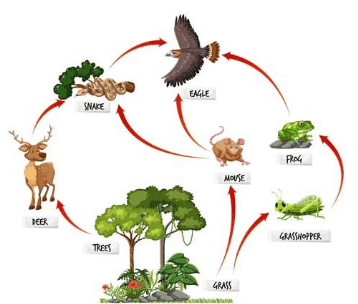When both organisms benefit
Mutualism
These organisms produce energy through photosynthesis or chemosynthesis.
Producers/autotrophs
One individual
organism
living things in an environment
biotic
An environment that provides the things an organism needs to live, grow, and reproduce.
habitat
A relationship between two species in which one species benefits and the other is neither helped nor harmed.
Commensalism
These organisms are herbivores, therefore they are called ______________ consumers.
Primary
eating other organisms is also called being a
consumer
An organism that is killed and eaten by another organism.
Prey
Non-living factors in a community are called..
abiotic
A relationship between two species in which one species benefits and the other is harmed.
parasitism
These organisms are typically at the top of the food chain. They are called ____________ consumers.
tertiary
What are the two secondary consumers?
snake and frog
A carnivore that feeds on the bodies of dead organisms.
scavenger
The organism that a parasite lives in or on in a parasitism interaction.
Host
An interaction in which one organism kills another for food.
Predication
This is a way to show how energy in a food web is allocated. Usually there is a large base and a pointed top.
energy pyramid
What would occur to the population of the secondary consumer if the tertiary consumer decreased?
their population would increase
Study of the interactions of living things and their environment.
ecology
An organism that breaks down wastes and dead organisms.
decomposer
Two or more organisms competing for the same resource.
competition
What is the percentage of energy LOST as it moves from producer to primary consumer to secondary consumer?
90%
what is the photosynthesis formula?
6CO2 + 6H2O --> C6H12O6 + 6O2
A series of events in which one organism eats another and obtains energy. Usually written on one line.
food chain
Includes all of the living and non-living things in an area.
ecosystem